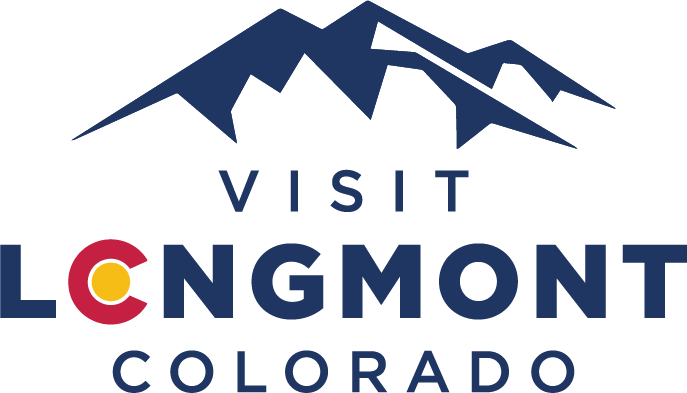
- HOME
- Things To Do
- Arts & Culture
- Art Galleries
- Art In Public Places
- Murals
- Performing Arts/Theatre
- Attractions
- Downtown Longmont
- Cheese Importers
- Cheese Making
- Hot Air Ballooning
- Mile-Hi Skydiving
- Day Trips from Longmont
- Dog Friendly
- Family Fun
- Farms & Farmer's Markets
- Longmont Farmers Market
- Farm Dinners
- Live Music
- Longmont Sunsets
- Museums & History
- Longmont Museum
- Longmont History
- Hygiene, CO
- Stephen H. Long
- J.C. Penney
- Tower of Compassion
- Teddy Roosevelt
- The Callahan House
- Ken Pratt
- Haunted History
- Sandstone Ranch
- Imperial Hotel
- Chief Niwot and the Left Hand Curse
- Dickens Opera House
- Ed Jones Building
- Parks & Outdoors
- Biking
- Birding
- Dickens Farm Nature Area & Tubing
- Fishing
- Golden Ponds
- Hiking
- Lakes & Rivers
- McIntosh Lake Nature Area
- Union Reservoir
- St. Vrain State Park
- Rocky Mountain National Park
- Shopping & Entertainment
- Spend the Day in Longmont
- Sports
- Golf
- Disc Golf
- Swimming
- Water Sports
- Winter
- Top Things To Do
- Wellness
- HOME
- Restaurants
- Asian
- Bars & Pubs
- Brunch
- Coffee Shops, Bakeries, and Ice Cream
- National Coffee Day
- Indian & Nepali
- Mexican
- Featured On TV
- Farmers Markets
- HOME
- Plan
- About Longmont
- Facts & Figures
- Multicultural Heritage
- History
- Old Town Longmont
- Prospect New Town
- eNewsletter
- Itineraries
- Winter
- Spring
- Summer
- Fall
- Carbonation + Elevation
- Girl's Weekend
- Perfect Longmont Itinerary
- Moving To Longmont
- Tips For Visitors
- Visitor Center
- Visitors Guide
- Digital Visitors Guide
- Transportation
Museums & History
Longmont's modern history dates back to 1870.
A group of prominent Chicago men established the "Chicago-Colorado Colony" before naming the town Longmont upon its completion in 1871. Longmont has three designated historic districts and nine locations on the National Register of Historic Places.
Cover Photo: Joan Weisman
Museums:
Longmont Museum and Cultural Center
Features changing and permanent exhibits in art, science, and history, and it also participates in the largest Day of the Dead celebration in the state. The museum’s 250-seat Stewart Auditorium hosts films, lectures, and performances of all types.
Longmont is also home to two small historical museums; the Dougherty Museum and the Agricultural Heritage Center.
Virtual History Tours:
Visit https://tourlongmont.oncell.com/ for historic photographs, text, and audio recordings that walk you through more than a dozen downtown locations from your smartphone. The text and audio are available in both English and Spanish. It is free to use, and doesn’t require any downloads.
There are currently three tours available:
Downtown Longmont
Latino History in Longmont
Women of Longmont
Historical Sites:
Access our online Historic Sites brochure here!
Hoverhome & Farmstead
The impressive brick residence and the utilitarian, frame farm buildings are inextricablt linked to each other and to Longmont’s agricultural past. On January 1999, Hoverhome and Hover Farmstead were added onto the National Register of Historic Places.
Sandstone Ranch
Sandstone Ranch Visitors & Learning Center is a historic property that was first homesteaded in 1860 by the Coffin family. The house (now the Visitors & Learning Center) and property sit on 313 acres of land abundant in natural, cultural and historic resources.
Callahan House
This historic Victorian home is a warm and lovely backdrop for elegant and memorable special events from dinner parties to weddings. The gardens are open for visitors all-year.
Old Mill Park
Old Mill Park was dedicated August 1, 1976 for historical and educational purposes. Containing original buildings, plantings, and artifacts, it has been designated a landmark by the City of Longmont.
St. Stephen’s Church
Old St. Stephen’s Church was built in 1881 as the first home for the congregation of St. Stephen’s Episcopal parish. Designated a local historic landmark and also listed on the National Register of Historic Places, Old St. Stephen’s continues to be owned and maintained by the Historical Society. Visitors are able to enjoy the historic ambience of the historic plaza surrounding the church and can tour the building on an appointment basis.

Results

